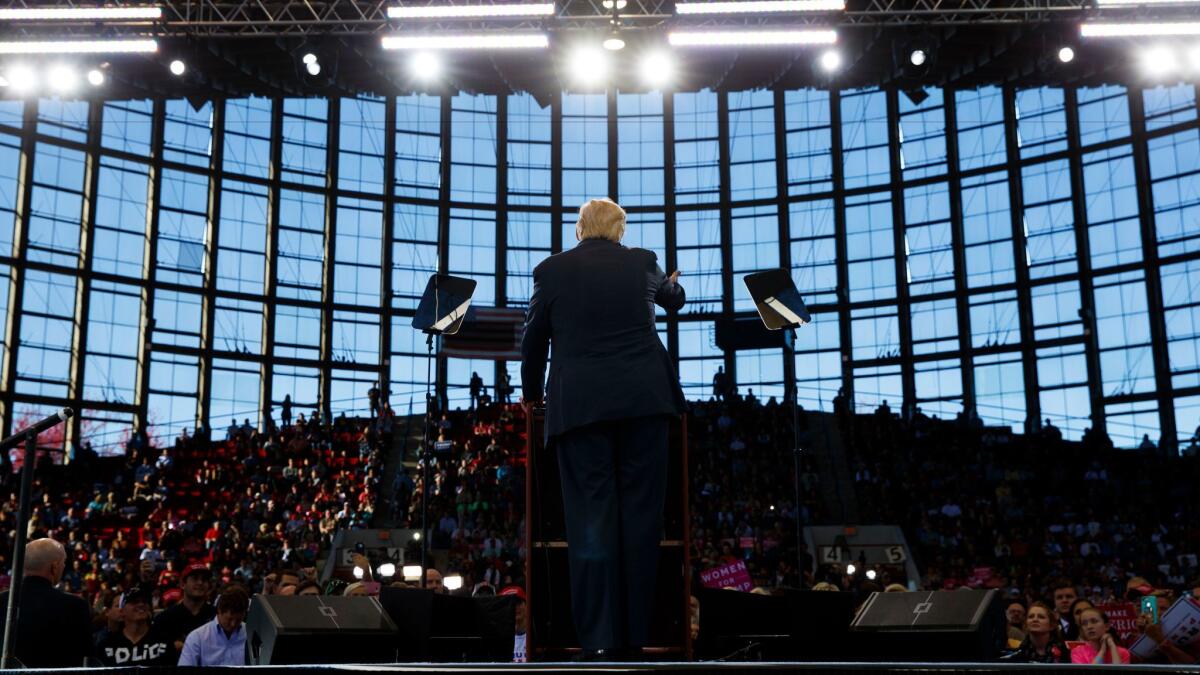Column: It’s been an otherworldly campaign, and we’re not returning to Earth anytime soon

For months there’s been a running gag on social media about “Earth 2,” where the 2016 campaign is a happy, normal thing. For instance, in mid-October, shortly after the release of the Access Hollywood video, I joked on Twitter that, “On Earth 2 [the GOP] is 15 points ahead, looking to gain seats in senate. Dem’s October surprise on Rubio’s water bill falls flat.”
Many of the quips are expressions of “Oh what might been” dismay from conservative Trump opponents about how horribly this election has gone. Understandably, Trump supporters tend not to find these jokes very funny.
But there’s more to the gag than shoulda coulda wouldas; it captures the fact that this whole election has been otherworldly.
Trump plays a major role in any conversation about how strange this election season has been. But I think historians will see him as a symptom.
There is a conservatism to politics. I don’t mean ideologically. It’s an art whose medium is human nature, which is largely permanent. And because of that, the practitioners tend to stick with what works. “What is conservatism?” Abraham Lincoln once asked. “Is it not adherence to the old and tried, against the new and untried?”
When something works over and over, it becomes a rule, not necessarily of science or the universe, but as an axiom, a rule of thumb. And whether Trump wins or loses, our thumbs seem to have lost a good deal of their utility.
Here is just some of what conventional wisdom held on the eve of the GOP primaries:
Republicans don’t nominate people without electoral experience unless they successfully invaded Europe. Conservatives are obsessed with character and/or ideological purity. Religious conservatives place an outsized emphasis on a candidate’s Christian bona fides. During hard times, voters look to successful governors to steer the party and the country. Republicans tend to pick the candidate “next in line” for the nomination, usually the runner-up in the last primary. The so-called “media primary” determines which candidates will be taken seriously by the voters.
None of these rules held. Not one.
The oddity of the GOP primaries may have been particularly intense, but the Democratic ones had their surprises too. For decades, Democrats took grave offense at being called “socialists.” But Bernie Sanders embraced the term and when Debbie Wasserman Schultz was the head of the Democratic Party, she bent over backward to blur the differences.
Our bizarro primaries, naturally enough, yielded a bizarro general campaign.
One of the oldest rules in politics is that voters prefer likable candidates. Hillary Clinton and Donald Trump – the two most disliked presidential candidate in the history of polling – have made short work of that. Similarly, I’m old enough to remember when gaffes mattered quite a lot. Those were good times.
For generations, pundits thought TV advertising could change voter attitudes; not anymore. According to the Wall Street Journal-NBC poll, in January, 40% of the electorate had a positive opinion of Clinton while only 29% had a positive opinion of Trump. In their latest poll, at the end of October, those numbers were unchanged.
It has been a hard rule of the political landscape for 30 years that Democrats have an easier “path” in the electoral college. But according to an analysis at 538.com, there’s a better than 1 in 10 chance Clinton wins the popular vote and still loses the electoral college.
For obvious reasons, Trump plays a major role in any conversation about how strange this election season has been. But I think historians will see him as a symptom. Demographic, economic and technological changes will surely be part of any “root causes” analysis, while foreign policy wonks might say the story begins with the Iraq war and the political and psychological dislocations it caused.
Others might point to Barack Obama, who broke one of the oldest rules of thumb in politics simply by virtue of being the first black president. But his contributions extend beyond that. He will have left the country more polarized and distrustful of elites – on both the left and the right – than when he took office.
Regardless of where or why you think things have gotten weird, the salient point here is that the election is just an illustration of the deeper weirdness of American politics – and that will not end when the votes are tallied. The next leader of the free world will not inhabit Earth 2.
Follow the Opinion section on Twitter @latimesopinion and Facebook
ALSO
A complete list of the L.A. Times’ 2016 endorsements
Fear and loathing and long lines on election day
To Donald Trump, from the undocumented immigrant who graduated alongside your daughter
More to Read
A cure for the common opinion
Get thought-provoking perspectives with our weekly newsletter.
You may occasionally receive promotional content from the Los Angeles Times.











